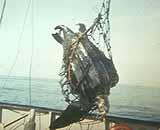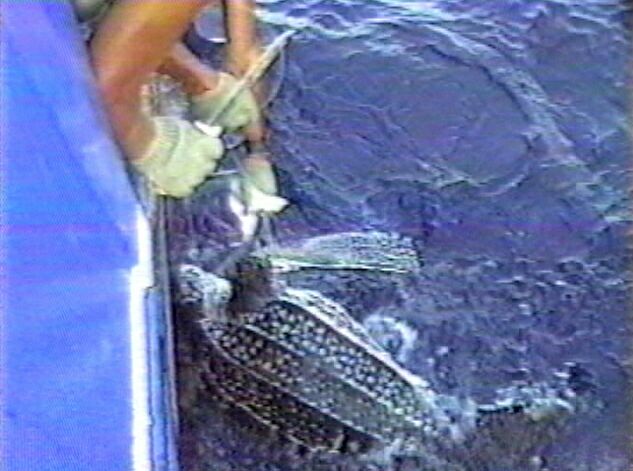
Dr.
Freddy Pacheco
Catedrático UNA
Version Español haga click aqui!
While the
speculation continues over the necessity of investing huge sums of money
to buy the lands close to the nesting beaches leaving aside the most
important cause of their disappearance, we will be witnesses and
accomplices of their criminal disappearance. While the subject is treated as a theoretical exercise
where the experts discuss or talk about this as if they were in academia,
there will be arriving fewer and fewer Leatherbacks to lay
eggs at Playa Grande and other beaches of the Latin American Pacific.Beyond the good intentions of those who
have interest in their survival, the certainty is that the time comes,
goes and after it will be impossible to replace. For the representatives
of dozens of organizations that call for a moratorium on long line
fishing that regulate the industrial fishing is the
areas corresponding to the migratory routes of these turtles, this type of
fishing constitutes the main threat to the leatherbacks of the
Pacific.
is treated as a theoretical exercise
where the experts discuss or talk about this as if they were in academia,
there will be arriving fewer and fewer Leatherbacks to lay
eggs at Playa Grande and other beaches of the Latin American Pacific.Beyond the good intentions of those who
have interest in their survival, the certainty is that the time comes,
goes and after it will be impossible to replace. For the representatives
of dozens of organizations that call for a moratorium on long line
fishing that regulate the industrial fishing is the
areas corresponding to the migratory routes of these turtles, this type of
fishing constitutes the main threat to the leatherbacks of the
Pacific.
The same is said to us by Doctors Frank
Paladino and James Spotila when they affirm that to save these
turtles it is necessary to take immediate action directed to minimize
their deaths caused by fishing. And they say therefore, thanks to their
biostatistical studies done
for many years in Playa Grande, it is clear to them that this
unsustainable adult mortality is “apparently a product of the fishing
activity of humans that will very soon lead to the extinction of the
population.” It is not enough then to give due protection to the nesting beaches in which these
invaluable animals nest, as they have done for 15 years in the Parque
Nacional Marino Las Baulas de Guanacaste.  For this Paladino and
Spotila are right when they say that “although with a total protection
of the
beaches, whatever population subjected to those rates of adult mortality
cannot survive for more than a few years.” History that is repeated in the
beaches of Mexico that before were of great importance for these same
turtles of the Pacific and today the number of females that arrive to lay
eggs are seen to diminish year by year and very accelerated.
For this Paladino and
Spotila are right when they say that “although with a total protection
of the
beaches, whatever population subjected to those rates of adult mortality
cannot survive for more than a few years.” History that is repeated in the
beaches of Mexico that before were of great importance for these same
turtles of the Pacific and today the number of females that arrive to lay
eggs are seen to diminish year by year and very accelerated.
In conclusion, to save them it is
necessary to close the fishing areas where these turtles congregate and
prohibit the form of fishing that is exterminating them as was very well
said by Spotila (ENN June 2000). This argument is shared by the Greenpeace
Mexico activist Juan Carlos
Cantú who claims (in February 2002) that “although when it is know for
many years that the tortugas laúd (or leatherbacks) of
We need, as much in
On the other side, it is necessary to
reaffirm the protection of the nesting sites so that the problem is not
made worse. For this we look to the
Finally, to not be directly
responsible for the environmental disaster, the disappearance of this
great reptile of the sea, it is necessary to act with reality and urgency,
leaving aside particular interests, although well intentioned, that seem
mistaken. For now we have the word of the authorities of the central and
local governments that they desire to work respectfully. Word that also we
left to the inhabitants of the coastal communities that surely want to
preserve for future generations the intrinsic natural wonder of the
presence of the leatherback turtle.

fpacheco@una.ac.cr
23.5.03